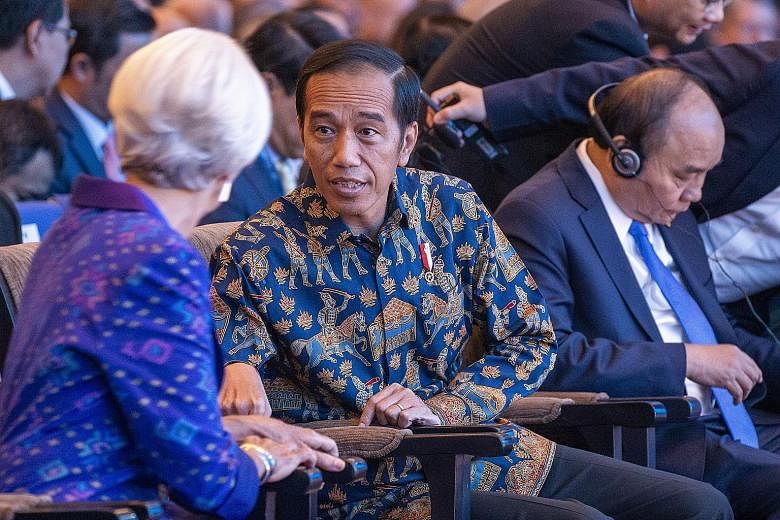Indonesia's President Joko Widodo yesterday turned to popular TV series Game Of Thrones to warn that "winter is coming", and urged countries to cooperate rather than compete to address mounting issues from market turmoil and climate change to technological disruption.
Addressing delegates at the International Monetary Fund (IMF)- World Bank annual meetings yesterday, Mr Joko compared the current state of the world to that in the fantasy blockbuster, where several "great families" and "great houses" compete to claim the Iron Throne.
But they are oblivious to a serious threat from the north, an "evil winter" that aims to decimate and rule over the world with ice and fire.
"With the threat from evil winter, they finally realise it is not important who will occupy the Iron Throne. The important thing is a collective power to overthrow the evil winter to prevent global disasters from happening and to prevent the world from turning into a barren and devastated land that brings misery for all of us," Mr Joko said.
The President reminded central bankers and finance ministers that the world has landed in the "final phase of global economic expansion", ripe with rivalry and competition, which could leave it critically worse off than the global financial crisis 10 years ago.
"We depend on all of you, global fiscal and monetary policymakers, to maintain the commitment to global cooperation," he said.
Mr Joko noted that already, the lack of cooperation and coordination has led to problems, citing the drastic hike in crude oil prices and disruption in currency markets in developing countries.
"Is this the right time for rivalry and competition? Or is this the right time for collaboration and coordination? Are we too busy competing and attacking each other that we fail to be aware of big threats that shadow all of us? Have we failed to be aware of the big threats faced by rich countries and poor countries?"
With the season finale of the series due next year, Mr Joko expressed hope that the story will end with a moral lesson, saying: "When victory is celebrated, and loss lamented, do both parties realise that the outcome of both triumph and loss in a war will remain the same: A devastated world?"
Is it not pointless to celebrate triumph amid destruction, to be the biggest economic power amid a sinking global economy, he asked.
He drew raucous laughter with a further reference to the show's "Mother of Dragons" character - in a nod to IMF chief Christine Lagarde, who smiled at the comment.
Ms Lagarde, who also spoke at the same event, acknowledged the global imbalances caused by trade, which, despite having created prosperity, also caused a backlash, as too many people have been left out.
To cope with the changing economic landscape, she proposed a "new multilateralism" which is "more inclusive, more people-centred and more result-oriented".
Ms Lagarde cited the agenda to achieve Sustainable Development Goals as an example of where strong cooperation matters, as low-income countries need an extra US$520 billion (S$715 billion) each year for investment in vital sectors such as health, education, water and infrastructure by 2030.
"This partnership is integral to the new multilateralism - not least because tensions arising from exclusion and climate change do not respect national borders," she said.
The IMF trimmed its forecast for global growth to 3.7 per cent this year, but projects Asia will expand by 5.6 per cent. This will, however, slow to 5.4 per cent next year, given financial market stress, policy tightening in some economies and increased trade tariffs.
Dr Changyong Rhee, IMF's director for Asia and the Pacific, warned that risks loom, with proposed US tariffs on US$267 billion of Chinese exports set to slash China's gross domestic product (GDP) by 1.6 per cent as well as Asia's GDP by 0.9 per cent in the first two years.
"Today's growth headwinds, from financial market tightening to trade tensions, could persist for some time," he said.
"It will be important for policymakers to save their ammunition for when it is truly needed," he said.
IMF also predicted a slowdown in Asean economies because of the global situation, but noted that they will still see stable growth. Indonesia, for instance, will pick up by 5.1 per cent both this year and next.

